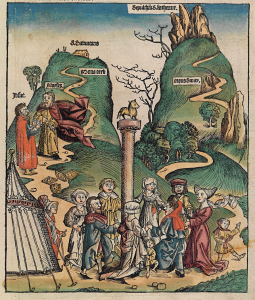Thoughts on Sunday’s Lessons for Oct. 11, 2020
First Reading (Track One): Exodus 32:1-14
Even when we do terrible things, even when we wallow in sin, God finds a way to forgive us in a banquet of loving grace.

Dancing Around the Golden Calf from The Nuremberg Chronicle (1493), illustrative woodcut from the workshop of Michel Wolgemut. (Click image to enlarge.)
This beautiful promise echoes through this week’s readings, beginning with the startling story we hear in Sunday’s Track One first reading: Moses is up on the mountain, talking with the Holy One, but things are going badly wrong below. The people, scared by Sinai’s smoke and thunder, are afraid that Moses won’t come back, don’t take long to break their brand-new covenant by worshipping a golden calf! God, righteously outraged, threatens to destroy the people and start a new nation with Moses. But Moses pleads for the people, and God relents. God’s abundant love flows to a people who may not deserve it, but they will be forgiven over and over again.
First Reading (Track Two): Isaiah 25:6-9
Using the two-line echoing of ideas that, like the Psalms, is typical of ancient Hebrew poetry, Isaiah speaks of the people’s relief from foreign domination after exile. The prophet exalts and praises a warrior God who destroyed the enemy while protecting the poor and needy. Then the narrative turns from warlike phrases to a beautiful song of hope. In verses that we often hear read at the time of burial, the prophet sings of a banquet that God will prepare: “A feast of rich food, a feast of well-matured wines … of rich food filled with marrow, of well-matured wines strained clear.” It will be a feast for the people of all nations, united at last in a kingdom where death and tears are no more.
Psalm (Track One): Psalm 106:1-6, 19-23
The Psalmist asks forgiveness for a people who have sinned, remembering God’s mercy even when they built and worshipped the golden calf. They forgot God, their Savior, who had watched over them in Egypt and brought them safely across the Red Sea and through the desert. They deserved destruction, the Psalmist sings, but Moses stood up for them and turned God’s wrath aside, revealing the Holy One who is good and forever merciful.
Psalm (Track Two): Psalm 23
And now, in the beloved 23rd Psalm, we sing of that very deep and abundant love, of God’s trusted protection. Our Good Shepherd who is always with us, comforting us and protecting us not only in the green pastures and still waters of good times, but even in those frightening times when we walk through the valley of the shadow of death. Just as Isaiah envisions a banquet table set for the people of God, the Psalmist, too, imagines a table of comfort spread out in the house of the Holy One.
Second Reading: Philippians 4:1-9
Paul now speaks to a specific pastoral issue in the church at Philippi. Two women, Euodia and Syntyche, have been quarreling. Without taking sides, Paul simply urges them to “be of the same mind” in Christ, perhaps suggesting that they ask, “What would Jesus do?” In beautiful language, he shows what that might look like: “Rejoice in the Lord always; again I will say, rejoice.” Be gentle and kind; true, honorable and just, pure, pleasing, commendable and praiseworthy, he exhorts all the church, and the God of peace will be with us.
Gospel: Matthew 22:1-14
What is Jesus trying to teach us about the kingdom of heaven this week? This parable might remind us of the wicked tenants in last week’s Gospel, who defied the person in charge and casually killed his messengers. Here in Matthews Gospel, as Jesus continues debating an angry group of Pharisees, he tells another strange and challenging parable: The king, angry at those who didn’t show up for his son’s wedding banquet – some of whom even killed the slaves sent to invite them – brings people off the street to take their places. Then, when one of them ungratefully refuses to put on a wedding garment, he’s tossed out into the darkness, too. We’re all invited to the kingdom of heaven, it seems. But even as welcomed guests, we’re expected to don the wedding garment by following Jesus’ way.
